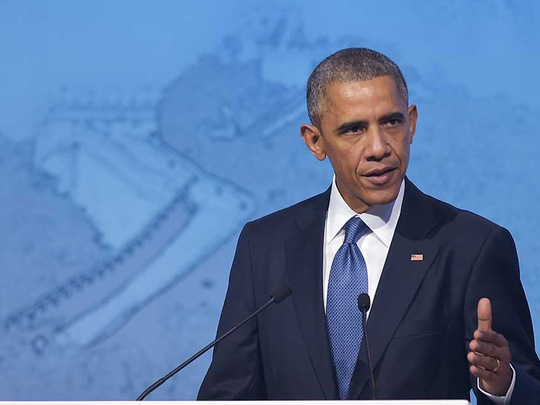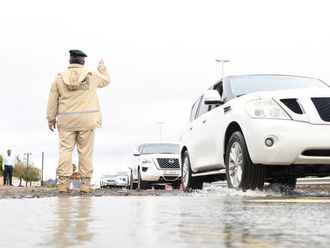
President Barack Obama couldn’t have been looking forward to his press conference on Monday in Turkey. Here he is, overseeing a war he says has “contained” Daesh (the self-proclaimed Islamic State of Iraq and the Levant). And there his critics are, asking why he hasn’t done more to stop these barbarians who have just committed atrocities in France and Lebanon.
Even still, the press conference stood out for how un-presidential the president was. In the wake of the tragedy, Obama spent much of his time scoring points against Republicans. He said his opponents wanted him to make a rash decision for the sake of a “neat headline”. “If folks want to pop off and have opinions about what they think they would do, present a specific plan,” he said, exasperation in his voice. He even audibly sighed after the third question from a reporter asking why he appears to have underestimated the enemy.
It’s understandable the president would defend his policy and lose patience with those who think it’s failing. But Obama’s version of recent history is misleading. He should be thanking many of his critics. In the last few weeks, he has begun to escalate the war against Daesh by finally doing many of the things his opponents have been recommending for months.
Last month, he deployed more special operations forces to Syria. He appears to have relaxed the restrictive rules for air strikes. The US confirmed on Monday that it had hit a fleet of trucks Daesh used for smuggling oil inside Syria. And Obama has reached out more directly to Syrian Kurdish fighters and some of their Arab allies.
This is all commendable. Yet the president, wary of becoming mired in the Syrian civil war and escalating the conflict in Iraq, had rebuffed all of these policies for nearly a year. And it’s far from clear he is committed to doing much more even in the aftermath of the Paris attack.
“The senior military leaders I have engaged with at the Pentagon and outside the Pentagon have been clear that there is no way to achieve the president’s objectives with limited resources, limited means and limited will,” Derek Harvey, a former top intelligence adviser to General David Petraeus in Iraq, told me Monday. “We wanted a no-fly zone. We wanted to take the gloves off and hit the strategic depth of [Daesh] in Syria more effectively, that includes special operations and air power.”
The president does not see it this way. On Monday he made a point of saying that he and his top advisers have analysed recommendations to send more ground forces into Daesh-controlled areas like Raqqa and Mosul. But ultimately, the experts concluded that US occupation of those cities was not sustainable and should be done down the road by local forces the US and allies are now training. Obama also went into some detail about why it wouldn’t work to create safe zones for moderate rebels in Syria, where they would be shielded from Russian and Syrian bombing.
No-fly zone unfeasible
Obama’s answer, in emphasising the input of his team of experts, gives the impression that he is following the lead of the professionals. In reality, Obama has overruled his top advisers many times in his presidency when it came to war in the Middle East. Let’s start with the no-fly zone. After Russia began its air campaign in Syria in September, it became unfeasible for the US to help establish such a space for the moderate rebels. The outgoing US envoy to the coalition against Daesh, retired general John Allen, said as much to CNN last month.
Before the Russian escalation, though, as my colleague Josh Rogin and I reported in September, Allen wanted a no-fly zone and pushed to send more special operations forces to help select air-strike targets in Iraq and Syria.
Allen’s private frustrations fit a historical pattern. In 2012, Obama dissented from his national security cabinet members, who pressed him to support a more robust plan to train and equip the moderate Syrian rebels not aligned with Al Qaida or what would become Daesh. At Saturday’s Democratic Party debate, Hillary Clinton, who was secretary of state at the time, pointed out that she favoured support for these rebels at the time.
Obama also ignored his generals in 2011 when it came to implementing his 2008 campaign promise to withdraw US soldiers from Iraq. The administration failed to reach a deal to extend the presence of US troops in the country in 2011, in part because Obama demanded that Iraq’s parliament vote to approve it, which was extremely unlikely. General Martin Dempsey, the chairman of the joint chiefs of staff at the time, told Congress that no one in the chain of command for the military favoured a complete withdrawal from Iraq. He would later say the job of securing a stable Iraq was left unfinished because of the premature exit.
In addition to showing his exasperation Monday, Obama was also at times incoherent. He observed that today Daesh controls less territory than it did a year ago. At the same time, he dismissed recommendations to send a large contingent of ground troops to take back the major cities the group has conquered over the last 18 months, a seeming acknowledgment that any territorial loss for the Islamic State is not that significant.
Obama was also unclear when it came to his strategy. He often spoke about it as if it were a work in progress. “A strategy has to be one that can be sustained,” he said, laying out how the US is strengthening local forces, targeting [Daesh]’s leadership, and cutting off its borders. “There are going to be some strategies we find that do work, and there are going to be some strategies that don’t work and when we find those strategies that do work, we will double down on those.”
Of course it is the nature of war to constantly adapt. President George W. Bush famously fired his first defence secretary after the 2006 elections and implemented a new strategy in Iraq when it became apparent that his war was failing. Bush, you could say, lost patience with losing. Obama, on the other hand, has shown too much patience for a strategy that to date has failed. His exasperation is reserved for his critics who are asking him to do more.










